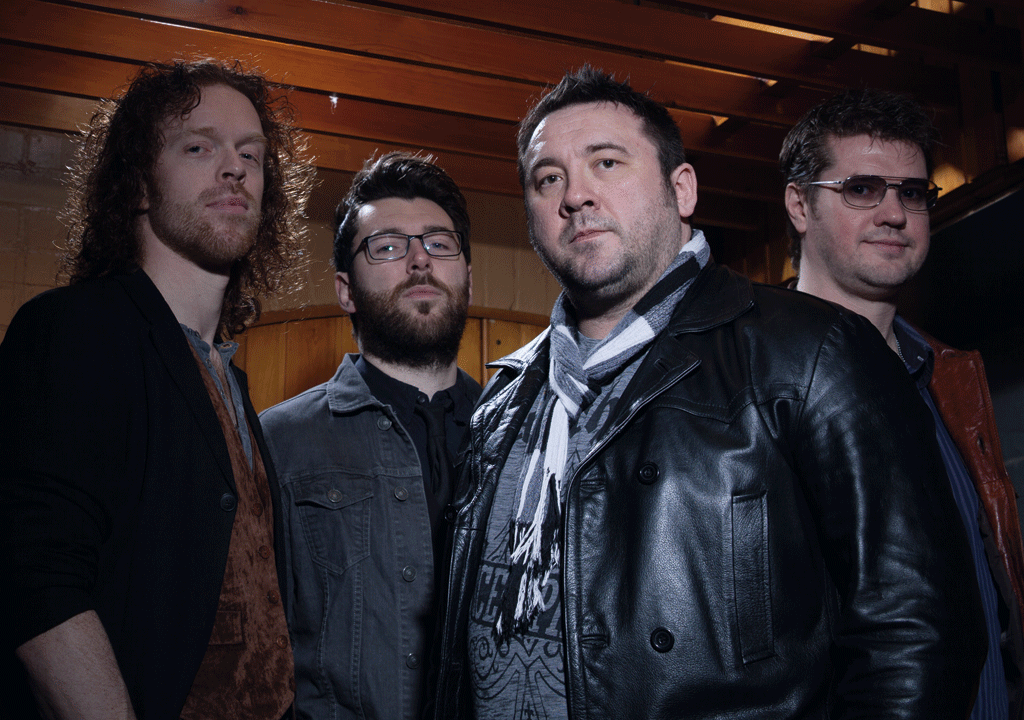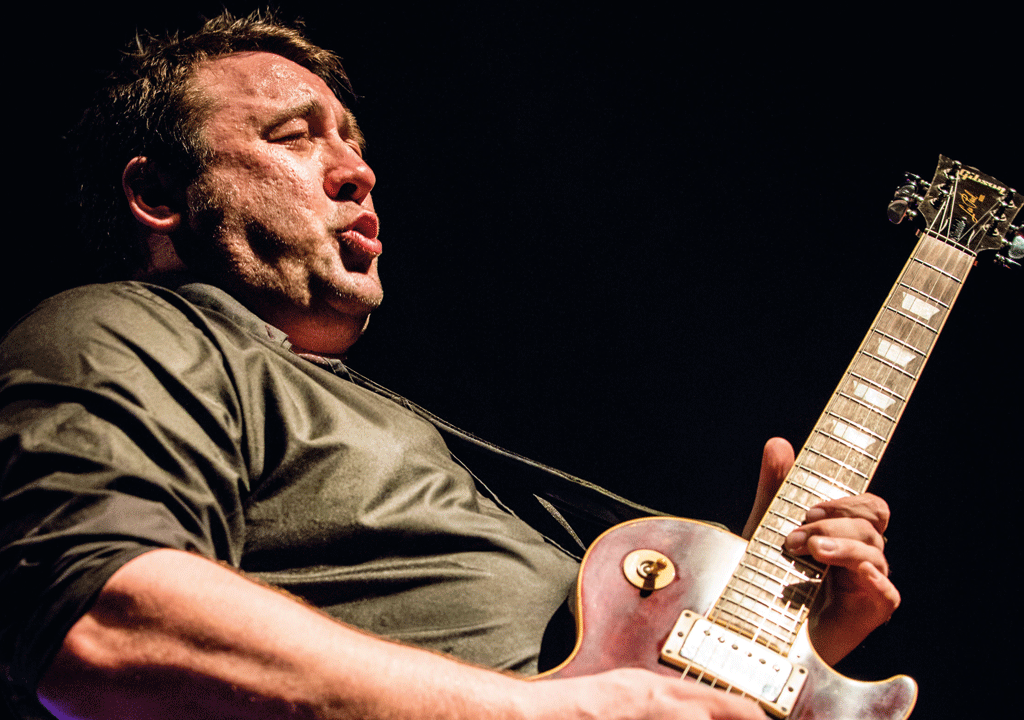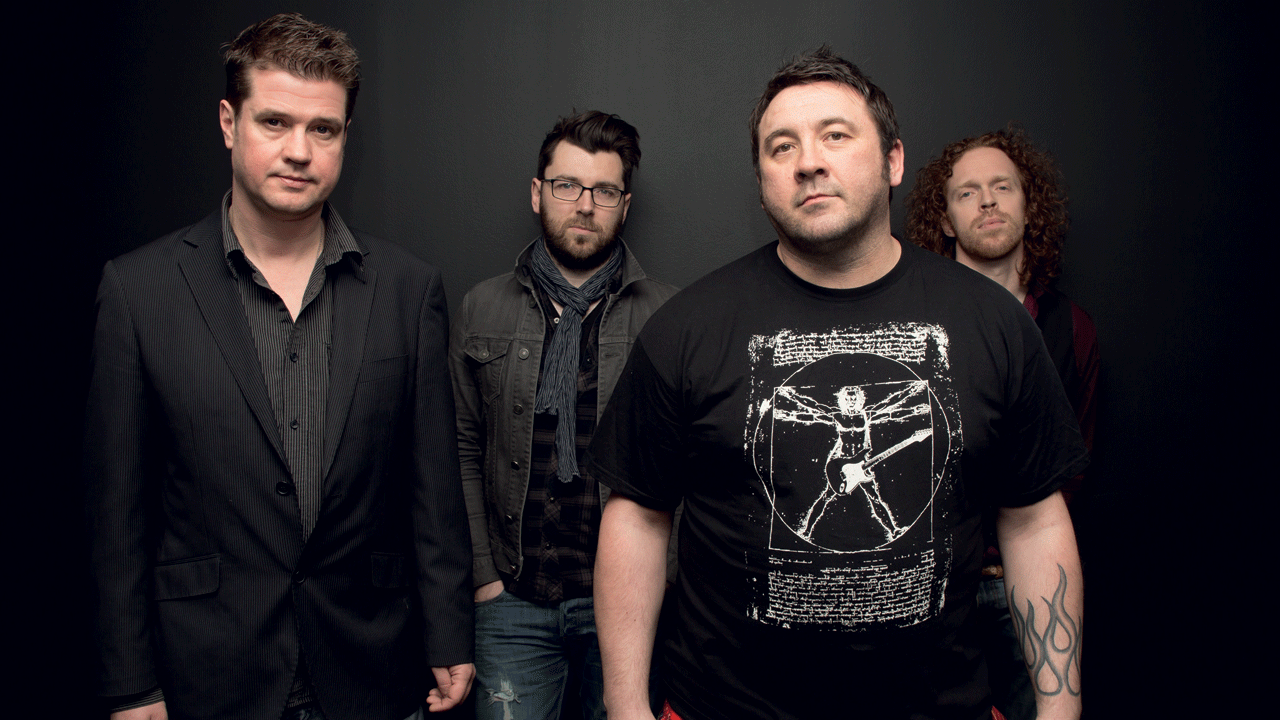He may be Britain’s current blues darling and have a sackload of awards to prove it, but Glasgow-born Alan Nimmo, King King’s string-bending, kilt-wearing frontman, is about the most unassuming gent you’ll ever meet. There’s not a trace of arrogance or guile in anything he says. He is straightforward and attentive, without any airs and graces. As for what’s behind the success of his staunchly modern four-piece, he can only speculate. “Really, I have no idea. Maybe the stars aligned. Maybe it was luck. Maybe it was meant to be. I just don’t know,” he tells The Blues, his vocal chords still spent from a recently completed run of 22 shows in the UK.
Upon second thoughts, he finds a more satisfying explanation for King King’s recent rise to prominence: simple hard work. Not particularly sexy, but effective. “We wanted to have a successful band and wanted to do it properly. It takes a lot of effort. I believe that if you work hard enough, you put yourself in a position for things to fall into place.”
Following the clean sweep at last year’s British Blues Awards (King King took home Band Of The Year and Album Of The Year awards as well as individual honours in the Male Vocalist, Bass and Drum categories), it’s no secret that singer and guitarist Nimmo, bassist Lindsay Coulson, drummer Wayne Proctor and keyboard player Bob Fridzema currently comprise the most popular home-grown blues act in the UK. It took them slightly more than five years to reach that pinnacle. With a brand new album set for release, they show no signs of reversing course anytime soon./o:p
But by no means has success come overnight for Alan Nimmo. He’s been kicking around concert stages since the 1990s, most notably in tandem with his guitar-toting older brother Stevie.
Sons of a local Glasgow singer (dad) and a diehard blues fan with a bountiful record collection (mum), the pair grew up surrounded by music and discovered the guitar at around the same time, despite an age difference of six years. Known simply as The Nimmo Brothers, they’ve released six albums in all (most recently the well-received Brother To Brother in 2012) and continue to tour together when their respective solo projects allow./o:p

Above: braw power! An audience with the King King…
Contrary to what’s been surmised in some places, Alan’s desire to strike out on his own, as he did by founding King King, had nothing to do with wanting to step out of his older brother’s shadow.
“What I do with my brother is great and I love it,” says the younger Nimmo clan member, who continues to reside in Glasgow during the rare times he is not on tour. “But in terms of the sound, The Nimmo Brothers is more guitar-oriented. I have always had ideas for a different style of song, and writing and arrangements which involved Hammond organ and pianos and all sorts of things like that. So I just wanted to do something a little bit different. It was nothing else, really. I wasn’t trying to move out of anyone’s shadow or trying to prove a point to anyone.”
After forming in 2008 and quickly releasing a self-funded EP entitled Broken Heal, King King then took a couple of years to hone their craft onstage, shuttling through a succession of drummers and keyboardists along the way. Despite the constant turnover within the band, their reputation as a first-class live act was already well established by the time they made their album debut with Take My Hand in 2011 – a mix of covers and originals that convincingly drew upon soul, blues and rock. Two years later, they raised the bar with the celebrated second effort Standing In The Shadows.
The quality of the musicianship on those first two albums is unassailable, but Nimmo – at least in the context of King King – is not a guitarist who attempts to floor the listener with fretboard acrobatics. For him, it’s all about the song, each one designed to tell a story or express an emotion with maximum honesty. His vision of the blues is as fundamentally down-to-earth as his rugged features, work boots and Royal Stewart tartan would suggest.
“I think blues is a feeling that comes from within,” he explains. “Whether you play a 12-bar blues, a ballad… as long as it comes from the heart and you mean what you’re doing and mean what you say, then to me, that’s blues.”

Above: the kings of British electric blues.
Without question, one of the band’s chief calling cards is Nimmo’s rough but nimble, soul-laden voice, one that recalls Rod Stewart, Free and Bad Company vocalist Paul Rodgers and at times even 1980s chart topper Paul Young. So it’s somewhat surprising to learn that he received no formal vocal training and initially regarded getting behind the microphone as a necessary evil. “I didn’t really ever consider myself a singer. I was a guitar player who happened to do a bit of singing because I was the frontman and I always wanted to be a frontman.”
The more he has relaxed into his role over the years, he says, the stronger his voice has become and the more clearly his musical influences have started to show through. “I grew up listening to Free and Paul Rodgers, Thin Lizzy, early Whitesnake, Thunder, Steve Marriott. If there is one thing all of them have in common, it’s passion. And honesty. That’s what appealed to me. As far as singing goes, I wasn’t just listening to the phrasing or how they sang. The character of their voice, combined with the passion and honesty – that is something I really identified with. And it’s what I wanted to bring to the table as a singer. So I just kept trying and kept singing. With each album I’ve recorded, it’s got better and better. It has got nothing to do with technical ability or singing lessons. I sing from the heart.”
King King’s latest release Reaching For The Light is built upon the same basic musical foundation and same instrumentation – guitar, bass, keys, drums – as its two predecessors. Yet when listening to the band’s discography in chronological order, it is impossible not to notice the considerable leap in scale on album number three. Reaching For The Light sounds bigger, bolder and more nuanced than anything they have ever done. At the same time, as Nimmo notes, his early classic rock influences are starting to make more noticeable inroads into King King’s timeless brand of modern blues.
Drummer and long-time bandmember Wayne Proctor co-produced the album with Nimmo at Superfly Studios in Nottinghamshire, a recording facility he runs together with sound engineer Andrew Banfield. According to him, the ginormous sound of Reaching For the Light can be attributed in part to some technical tweaking he and Banfield did prior to the sessions. “We’re constantly investing in our gear to raise the game on all the albums I am involved in as a producer,” he says.
Proctor has already worked with many of the UK’s top contemporary blues artists, including Aynsley Lister, Ben Poole, Ian Parker and Oli Brown. He took King King’s newest project as an opportunity to do a bit of high-end studio refurbishing. It ultimately helped them attain a sound he describes as wider, deeper and richer. The key – for you techies – was choosing to record the album at a sample rate of 192 kHz.
“Standing In The Shadows was done at 48 kHz. So essentially, you are talking four times the depth. It’s kind of like HD TV versus normal television. Brighter colours, deeper blacks. It works the same with audio. Everything we recorded instantly had more air, more depth and needed less manipulation to get it to sit in the mix. Everything just had space and depth of field much more naturally.”
When the final mixes were sent to sound guru Ray Staff for mastering – a man who has put his stamp on everything from Mott The Hoople’s All The Young Dudes to Seasick Steve’s Man From Another Time – even he was impressed. “He commented it was one of the most analogue-sounding albums he had mastered in years and celebrated the fact we had recorded it at 192 kHz,” smiles Proctor. “He could hear something was different.”
As for Nimmo, he is always more than happy to let his mates handle the knotty technical details.
“I don’t get mixed up in massive conversations about what programmes or amps or microphones we’re using. That’s for engineers to think about.”/o:p

Above: Alan Nimmo doing what he does best…
As on previous albums, his role as co-producer was rather a conceptual one. “What I do in terms of producing is, I search to find the essence of a song and then try to write and produce something I think is meaningful. I just write songs and want them to be a certain way. More importantly, I want them to feel a certain way. I want them to have an impact on the listener. Fortunately, I have guys like Wayne and Andy at the studio who can bring that to life technically. At the end of the day, what we have is a strong partnership.”
Nimmo and Proctor, along with founding bassist Coulson and newest member Fridzema (who replaced Bennett Holland on keys in 2013 to complete the current line-up), shared in the desire to make bold strides on the band’s third album and consequently put in long hours at the studio. While having a recording facility at their constant disposal helped to keep the production costs under control, according to Proctor, the work ethic behind Reaching For The Light was not unlike that of a big-budget rock album.
“We took our time. As a band we knew we had to raise our game in every department – we wanted the songs, sound and performance to be a 100 per cent improvement upon Standing In The Shadows. We did long periods of pre-production and focused on getting the arrangements, the feel, the tempo, all the parts right before we hit record.”
One noticeable embellishment is the increased use of intricately layered vocal harmonies, giving many of the tracks on Reaching For The Light a poppy, more radio-friendly feel. “We all came out of Standing In the Shadows with a greater communication and trust between us,” Proctor adds. “When that happens, you can start to take risks and suggest things that, even if they don’t work, can inspire the next idea. The more elaborate harmonies, arrangements and orchestrations of the songs are a product of that willingness to experiment and try stuff out.”
The mighty and meaty guitar tone heard on rock-oriented cuts like Rush Hour and Crazy (Nimmo’s debt to Paul Rodgers is never more apparent than here) is a force in its own right. While Nimmo may not be technically inclined on the whole, he is willing to put time into perfecting the sound of his axe.
“I always have an idea in my head of what I want a song to sound like and what kinds of sounds I want to hear when I’m performing the music,” he says. “So we’re constantly tweaking amps to get the best possible sound. I’m always striving to find that real nice sweet sound.” The trial-and-error method seems to be working. “I’m not a technical wizard. I’m just a musician and a bluesman and a songwriter. I want to hear the songs how I hear them in my head.”
He takes the same no-nonsense approach to songwriting. Every lyric he has ever written is based on personal experience. “I don’t make stories up. I just basically talk about what’s happened to me.”
You Stopped The Rain, for example, came to Nimmo in 2009, when his older brother and musical partner Stevie was fighting a protracted battle against throat cancer that temporarily cost him his voice. Rush Hour – one of the standout cuts on Reaching For The Light – has a more unlikely history: it starts off with lyrics Nimmo penned when he was only 15. The image of a young Alan Nimmo committing his teenage angst to the pages of a notebook may be hard to conjure up today, but indeed, he took his first steps as a songwriter during his youth in Glasgow.
“It was a difficult time,” he reflects. “As a young teenager growing up in Glasgow, with certain family background things that were going on, I felt a lot of pressure on me. At the time I wrote the lyrics [to Rush Hour], I felt like I was struggling to breathe in a philosophical sense. But luckily, I was able to write these things down. I didn’t know if I would use them in a song. I just kept them in a book for myself.”/o:p
In particular, the line that opens and closes Rush Hour – ‘From the moment that I wake up till the very last blink of my eye, feels like rush hour’ – remained with him through the decades. For reasons he cannot pinpoint, Nimmo felt it was finally time to complete the lyrics and record the song. He is confident the words he used to finish it off relate to those he formulated so many years ago. “I wanted to make sure of that,” he says. “And I think it worked.”
Could his decision to revisit the tune have something to do with the current pace of his life? Has the pressure on him been ratcheted up since King King caught on and started touring the globe?
“Definitely,” Nimmo nods. “I spend less and less time at home. More time on the road. That can be very difficult when you’ve got a family. It’s quite hard to juggle it all.” With the release of Reaching For The Light in May and extensive touring scheduled throughout the year, there doesn’t appear to be any let-up in sight. But Nimmo’s desire and commitment to stay the course hasn’t wavered for a moment, even if he would prefer to spend a bit more time inside his own four walls.
Would he change anything? Not a chance.
“We know that we had to do all this. That we had to sacrifice and get on the road and do all the hard work. I think it does change your life, because you do sacrifice time at home and all that. But it’s definitely worth it in the end.”/o:p
Reaching For The Light is out now via Manhaton./o:p
Honest I Do
King King frontman Alan Nimmo revisits his musical roots…/o:p
“I’m very simple in my musical tastes,” admits the King King singer and guitarist. For him, whether it’s rock, blues, R&B or even country, good music can be boiled down to two essential ingredients.
“I always come back to the passion and honesty of people’s singing and playing. If it sounds like they mean what they’re doing, I’ll be drawn to it.” The records Nimmo discovered as a youth still echo in the songs he writes today.
**FREE: **Fire And Water (1970)
“Free are one of my favorite bands of all time. I grew up listening to Paul Kossoff and really identified with his style of guitar playing. And of course, Paul Rodgers as a singer. I was moved by what they did. Any of the Free albums will do just fine, but Fire And Water is the one that stood out for me. I heard the song Fire And Water when I was a young kid and it really blew me away.”
THIN LIZZY: Live And Dangerous (1978)
“Between the ages of 12 and 16, I got into a whole host of music. My friends and I were all starting our own bands and learning riffs from Ritchie Blackmore and Paul Kossoff and Peter Green. Brian Robertson, who played with Thin Lizzy, is a Glaswegian guitar player who was full of passion and fire in his playing. He really spoke out to me. Live And Dangerous was just a cool album to listen to.”
FRANKIE MILLER: Standing On The Edge (1982)
“Another Glaswegian singer. He managed to sing in a way that made you stop in your tracks. His tone, his vocal range, but mostly because he sang everything with passion and honesty. It was always apparent that the man was singing from the heart. If I hear that in a person’s voice or in a lyric, I’m instantly drawn to it. That’s what Frankie did for me.”
FLEETWOOD MAC: Mr Wonderful (1968)
“I love Peter Green’s Fleetwood Mac and Love That Burns is something I find really beautiful. I’ll never forget the first time I heard that song on a record player. I was probably about nine or 10 years old. It was amazing to hear that kind of guitar tone. No one had ever played that way before. I listened to it over and over and still listen today with the same passion.”
BB KING: Live At The Regal (1965)
“As a young blues player, Live At The Regal is one of those albums that automatically becomes a part of your apprenticeship in blues. Listening to it and playing along to every song. The whole record just sounds amazing. And BB King’s voice is so powerful and so passionate.”/o:p



